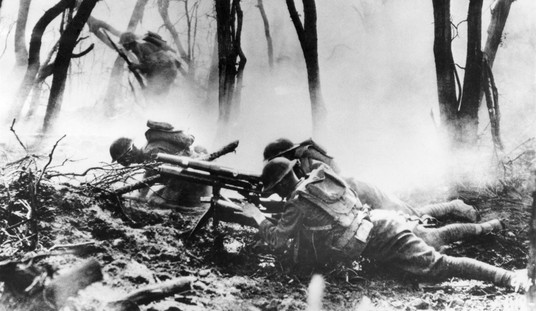
Ars gratia artis
There’s always been a strain of intolerant yahooism running through segments of the modern conservative movement, an ignorance and suspicion of the fine arts in all their forms. It’s bad enough when it comes from the populist, talk-radio side of the right wing; it’s worse when it comes from the allegedly more sophisticated side of the movement. But so it has.
Tonight in New York City, the Metropolitan Opera will stage the John Adams-Alice Goodman opera The Death of Klinghoffer, first performed back in 1991 in Brussels under tight security for fear of Muslim backlash (this was a decade before 9/11, remember) and widely produced elsewhere since. This evening, as the audiences file into Lincoln Center, there will also be tight security — but this time the protests come largely from the other side.
The wheelchair protest is planned, the ex-governor continues to speak of his disgust, and those attending the Metropolitan Opera’s latest production Monday will find a first in their programs: A letter denouncing what they’re about to see. This is the swirl of controversy surrounding the Met’s premiere of “The Death of Klinghoffer,” the John Adams opera that is based on the brutal murder in 1985 of Leon Klinghoffer, an elderly Jewish tourist shot by Palestinian terrorists and pushed into the sea from the deck of the cruise ship Achille Lauro.
The controversy, which has sparked protests at Lincoln Center, a letter-writing campaign and the cancellation of the Met’s broadcasts of the opera, seems to have left everybody involved unhappy. “Ignorance is always frustrating,” said Peter Gelb, the Met’s general manager, complaining this week about the critics, who he believes have been too aggressive in their attempts to block the production.
“It’s unfortunate and it’s wrong,” former New York governor George Pataki said of the Met’s decision to program “The Death of Klinghoffer.” “Just the title says it all. Klinghoffer didn’t die. He was murdered.” And Adams said that the Met’s decision to cancel the movie theater simulcasts and radio broadcasts of “Klinghoffer” was “radical” and “damaging in every way.”
The New York Times noted this morning:
Peter Gelb, the Met’s general manager, who said that he had received threats related to the opera and that some cast members had been harassed online, addressed the performers and musicians at Friday’s final dress rehearsal to tell them about enhanced security measures. “We just want to take every precaution so that everybody is safe and secure on Monday,” he said.
Although the opera, and the Met’s decision to stage it, is being attacked by a number of religious and political figures, both are being praised by some artistic figures. “Klinghoffer” has been performed earlier in New York at the Brooklyn Academy of Music and the Juilliard School.
“It is not only permissible for the Met to do this piece — it’s required for the Met to do the piece,” Oskar Eustis, the artistic director of the Public Theater, said in an interview. “It is a powerful and important opera. It tackles an issue that, as we are seeing now, is radioactive in our culture. And precisely because of its radioactivity, that’s why it needs to be tackled.”
At issue is not the quality of the work, but the perception that by depicting the murder of a wheelchair-bound American Jew on board an Italian cruise ship by a group of Palestinian terrorists — and by giving the terrorists their say — the opera is somehow endorsing both murder and Jew hatred. It’s like arguing that because Shakespeare gives Iago many of the best lines in Othello — and because Verdi gives the villain the most memorable aria in his operatic version, Otello — Shakespeare and Verdi are personally endorsing blasphemy. Similarly, in Mozart’s Don Giovanni, we first meet the lecherous Don in the act of raping Donna Anna, and later he gets dragged down to Hell completely unrepentant; this does not mean that Mozart and da Ponte are celebrating rape.
The problem lies with the opera’s historical-political subject matter. Those who know next to nothing about opera seem to think this is proof of a political argument, forgetting that opera is often about real-life political events, sometimes disguised for censorship reasons (Verdi’s Un ballo in maschera) and sometimes not (Verdi’s Don Carlos, based on the historical play by Schiller). Further, Klinghoffer is not even the first politically themed opera by its creative team — that honor went to Nixon in China, which discomfited its leftist critics with a sympathetic portrayal of the title character, old Tricky Dick himself.
As it happens, I attended both the world premiere of Nixon in Houston in 1987 — 27 years ago on Wednesday — and was similarly present at the first performance of Klinghoffer in Brussels four years later in my capacity as the classical music critic for Time magazine (my complete Klinghoffer review is appended to the bottom of this post). Indeed, I know most of the principals involved in the creation and first production of the opera, including the composer, whom I first met and championed in 1978; the librettist; the original director (Peter Sellars); and the first conductor, Kent Nagano. I have known Peter Gelb — son of Arthur Gelb of the New York Times and a grand-nephew of the violinist, Jascha Heifetz –since 1981. So let me state both my personal biases and my conclusions right up front: Klinghoffer is not Palestinian propaganda, the work is not anti-Semitic and the animus directed against it is a disgrace that ought to be rejected both by conservative and liberals alike.
I first noticed the campaign against the opera back in June on a website called TruthRevolt: “Outrage Remains as Met Still Set to Host the Anti-Semitic Production,” read one inflammatory headline; “Met Opera Stands with Anti-American Jew Hating Production,” went another, as the story compared the work to — you guessed it — the Nazis. After Met general manager Gelb canceled the worldwide telecast of the opera, the site, smelling blood, then sought to force the Met to remove the production from the its schedule entirely.
Tell the Metropolitan Opera that Americans do not want to see a production likening terrorists out to heroes! We will not support an opera that reeks with anti-American, anti-Israel and anti-Semitic rhetoric.
The critics of this opera — few, if any, of whom have actually seen it — are trying to argue two things simultaneously: first, in favor of the dehumanization of the Palestinian Arabs (whatever you may think of their cause, or lack of it); and second, in favor of overtly politicized, didactically correct art. Using the smear of anti-Semitism the way “liberals” wield the smear of racism, they seek to shut down debate. Fortunately for the cause of artistic expression, they’ve failed. Here’s Jeremy Gerard, writing about the flap at Deadline Hollywood (emphasis mine):
On Monday night, you can expect to hear about rabid protesters hollering across police barricades in front of the Met on the vast plaza at Lincoln Center. Their issue? This serious work of musical art has the audacity to give voice to a Palestinian point of view — in an opera that is unequivocal in its ultimate horror at the heartless murder by a terrorist gang of an innocent, elderly disabled Jew. As usual in such cases, much of the outcry and breast-beating will be led and populated by people who haven’t bothered to see the show that prompted all the fuss. Their moral hackles are all hot and bothered by talk about the work rather than the work itself. They know what they hate…
As Justice Louis Brandeis said, “sunlight is said to be the best disinfectant.” To which I would add, “… even at the risk of causing blindness.” That’s what artists do: Shed intense light in dark corners, sometimes at risk of starting a fire. The Met already has succumbed to outside pressure by canceling a planned telecast of The Death Of Klinghoffer, while admirably remaining steadfast about the performance itself.
One reason they failed is that they don’t understand the nature of art. Many of the assaults on this work are made by simply quoting cherry-picked lines from Goodman’s libretto, as if an opera were a play and as if the writer is personally endorsing whichever sentiment one of his or her characters might express. But it is not the job of the writer to coo in his audience’s ear or mollycoddle their sensibilities. Bad characters — and the cowards who murdered a wheelchair-bound victim are very bad characters indeed — say and do nasty things.
Further, they ignore the role the music plays in the work (without music — and sets and costumes and sometimes dance — it’s not an opera). Music propels, envelops, comments, underscores and very often simply takes over. If you want to look for subtext in opera, listen to the music, which carries the real freight. If you think The Death of Klinghoffer is anti-Jewish Palestinian propaganda, or that it “glorifies terrorism” (and please remember this opera was premiered 23 years ago, not yesterday), or that it’s unsympathetic in its portrayal of the Jewish characters, then listen to Mrs. Klinghoffer’s final aria and get back to me.
[jwplayer mediaid=”4911″]
Or better yet, see it yourself. As Alex Ross noted in the New Yorker: “Anyone who thinks that ‘Klinghoffer’ romanticizes murder probably has not sat through it to the end.” You can also read my colleague John Rockwell’s New York Times review of the opera here. My original review follows on the next page; the opera has been revised since the premiere, with the elimination of the prologue and other, lesser, changes.
Originally published in the April 1, 1991 edition of Time Magazine:
Art and Terror in the Same Boat
By Michael Walsh/Brussels
Few operas in history have been as instantly controversial as The Death of Klinghoffer. To begin with, the subject matter is politically incendiary: the brutal 1985 murder of a wheelchair-using American Jew by Palestinian terrorists aboard the Italian cruise ship Achille Lauro. Further, the opera is the second collaboration by composer John Adams, librettist Alice Goodman, choreographer Mark Morris and director Peter Sellars — the people behind Nixon in China. That dazzling 1987 opera left a trail of argument in its wake as it made its way across America and Europe. Surely, Klinghoffer would be even more provocative than its predecessor. Wouldn’t it?
The Belgians thought so. During the gulf crisis, some of them urged that the opera’s world premiere in Brussels be postponed, out of fear that it might incite real terrorism. When the opera had its world premiere last week at the Theatre Royal de la Monnaie, security was tight. But surprise: Klinghoffer is not that kind of provocateur. Just as the lyrical and deeply humanistic Nixon confounded many who had expected a leftist demonization of the old unindicted co-conspirator, so has this sweet, sorrowful Klinghoffer upended everyone’s expectations.
For one thing, it’s no Nixon. That work contained big, powerful set pieces: the Nixons’ arrival in Peking aboard the Spirit of ’76; the spellbinding banquet scene; a hallucinatory ballet; a tender aria for Pat and a hair raiser for Madame Mao. Instead, the new work takes its cue from Nixon’s third act, a contemplative series of interlocking monologues that stripped the statesmen of their blue suits and Mao jackets and revealed them for the tired, nervous and scared human beings they were.
Accordingly, Klinghoffer is no docudrama but rather a stylized, subtle, Rashomon-like retelling of the tragedy. It takes no prisoners, and takes no sides either. On Sellars’ voyage, confusion is captain, and perspectives shift like ocean waves. Along with Leon Klinghoffer, truth becomes a casualty. The director has clad the entire cast in anonymous street clothes, and many roles are doubled — now friend, now foe — and who can tell the difference?

In that case, it also glorifies blasphemy and rape
“On the ‘politically correct’ scale, we don’t even register,” comments Sellars gleefully. “People come expecting machine-gun fire and bodies being thrown overboard, and what they get is a bunch of art.” Complementing Sellars’ vision is Morris’ integrated choreography: a silent shadow subtext that swells emotionally as the opera progresses until it hijacks the action, transforming and finally transfiguring it.
In his most flexible score to date, Adams has erected huge choral pillars to frame the action and provide context. In between, he spins out long, shimmering arias whose sinuous lines deny the listener the security of a conventional verse-chorus-verse structure. Once a card carrying minimalist, the composer now weds a sturdy rhythmic pulse with a freer melodic and harmonic idiom that can evoke with equal aplomb a Monteverdi arioso, a Mendelssohn scherzo or Duke of Earl.
Goodman, the Cambridge-based poet, writes vigorous, stark verse whose impact is almost physical. “My father’s house was razed/ In nineteen forty-eight/ When the Israelis passed/ Over our street” are the first words of the opera, sung by a chorus of exiled Palestinians; later the Israelis get equal time. Goodman combines flights of fancy with earthy images and expressions — this must be the first operatic libretto in history to employ the word asshole and the Yiddish meshugaas. Yet, as in Marilyn Klinghoffer’s homey pieta, Goodman can soar. “I have only a short time,” the widow sings after learning of her husband’s death. “What can part us while I live? I grieve as a pregnant woman grieves for the unseen long-imagined son.”
Expertly conducted by Kent Nagano, the cast included such Nixon veterans — and Sellars favorites — as Sanford Sylvan as Klinghoffer, James Maddalena as the ship’s captain and Stephanie Friedman as one of the terrorists.
Some flaws: the comic prologue seems superfluous, sandwiched as it is between the potent Palestinian and Israeli choruses. Singing in English, the Belgian chorus was unintelligible; Goodman’s dense text demands supertitles. And one does miss some of Nixon’s stirring climaxes. But none of this should impede Klinghoffer‘s success. Already the opera has been scheduled by its other co-producers — the opera companies of Lyon; Glyndebourne, England; San Francisco; and Los Angeles — as well as the Brooklyn Academy of Music, where it opens in September. This broad international debut will serve to confirm Adams, Goodman, Morris and Sellars as the foremost creative team working today on the operatic stage, and perhaps on any stage.









Join the conversation as a VIP Member